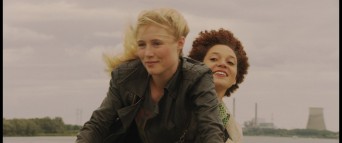Telling the quietly inspirational story of young shy Anne finding her voice and her self, this dreamy, wistful film is more than your average lesbian flick. Loosely based on a play written by screenwriter Marjolein Bierens and directed with a soft touch and an eye for lived-in detail by Colette Bothof, Summer is as surprising as it is refreshing. Though this is a film about a girl who falls in love with a girl, Anne’s sexuality itself is almost irrelevant, the story having much more to do with insiders vs outsiders, tradition vs freedom, and what happens when you outgrow the place you thought you belonged. What results is a complex, interesting coming of age story that just happens to feature a lesbian.
The film opens with our introverted protagonist Anne in a fleet of village kids whipping down tree-lined lanes on their bicycles, surrounded by gorgeous Dutch countryside, beneath the buzzing wires of the power station that is the hub of their community. Anne, known to most as Ms Silent, is a quiet, amiable girl who shares a close relationship with her disabled little brother and tries to see the best in people. Her silence, however, allows her to observe others and as we listen to her narrated musings about the narrow-minded attitudes of her peers, the bitterness of her mother and the domestic abuse the community turns a blind eye to, we learn that Anne is beginning to question the small world she grew up in.
The script and Sigrid ten Napel’s performance manage to make sure that though she is perceptive, Anne is never judgmental, and though she is critical of her family and community, she is also fiercely loyal to them. That is until she meets free-spirited biker girl, Lena. A mixed race city kid who’s moved to the village with her sick mother, a former artist, Lena is a breath of fresh air to Anne. Unfortunately, the rest of the village doesn’t feel the same way.
Summer has a timeless look that really makes it universal and keeps distracting technology out of the way. This, Bothof told me, was totally intentional. “Because sometimes in certain places -especially in the countryside – it can feel like time has stood still.” The director herself grew up in a place not unlike the village in the film and her experience as the outsider kid of parents from the city seems to have influenced the not-quite-belonging theme.
What really makes the film special is what Bothof describes as “the combination of rawness and poetry in the story”. Anne’s life, like the lives of those around her, is filled with harsh realities and yet the expressive grace of her character lends a softness and an innocence to a film that deals with some serious issues. As Bothof puts it, “We wanted to make a film that was full of these contrasts: raw and poetic at the same time, beautiful and ugly, industrial items in a vast natural landscape, wanting to get away yet still feeling attached to your roots.”
Our perception of Holland is of a utopia of beautiful sexually liberated stoners, but like a lot of European countries, in the smaller places life can be just as conservative as anywhere else. Bothof was interested in portraying the darker layers that lie beneath life in her country, since she says Dutch people themselves like to believe they are totally liberal, despite abuses that often comes to light.
The key metaphors at the heart of the film are the power station, which provides employment and activities for the community, and the Catholic church, which provides hope and guidance. “Both the church and the power station represent a power that’s bigger than life,” says Bothof, “The invisible glue that is omnipresent and binds them together and in an kind of “magical” way always influences theirs lives.” Without the rigid structures that these institutions provide, the people of the village would be lost, and when Anne chooses to affiliate herself with the outsiders, she rejects not only the oppressive restraints of these institutions, but their comforts as well. A fine metaphor for the agony of growing up, where we must leave behind what is familiar – parents, home, school – in order to find our own sense of comfort and meaning.







